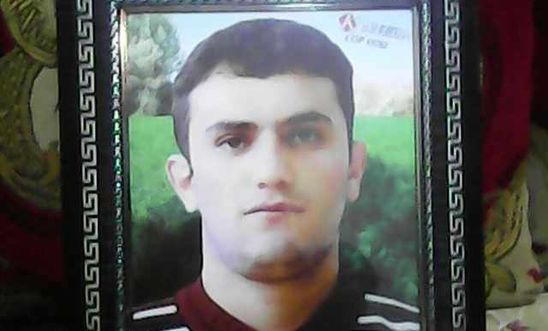
Press releases
Iran: child offender to be executed on Thursday

Letter from Saman Naseem details how as 17-year-old he was tortured for 97 days into making a false confession
Saman was kept in a cell just 50cm wide and tortured until ‘unable to walk’
A young Iranian man set to be hanged at dawn on Thursday has given a harrowing account of how, as a teenager, officials tortured him for 97 days to make him “confess” to a crime, before sentencing him to death.
The authorities at Oroumieh Prison, in Iran’s West Azerbaijan province, have told Saman Naseem that his execution is scheduled for 19 February, and Amnesty understands that a doctor visited him on or about 10 February amid fears that the check-up was a pre-execution assessment.
Saman was originally arrested on 17 July 2011 after a gun battle in the city of Sardasht in West Azerbaijan province between Iran’s Revolutionary Guards and the armed opposition group Party For Free Life of Kurdistan. After his arrest, the 17-year-old Saman was held in a Ministry of Intelligence detention centre without access to his family or a lawyer.
In a letter seen by Amnesty, Saman, now 22, describes how he was kept in a cell only 50cm wide and two metres long, which also included a toilet, and was repeatedly tortured before being forced - while blindfold - to put his fingerprints to “confession” papers. His “confession” led to a conviction for membership of an armed opposition group and taking up arms against the state. In the letter Saman says:
“During the first days, the level of torture was so severe that it left me unable to walk. All my body was black and blue. They hung me from my hands and feet for hours. I was blindfolded during the whole period of interrogations and torture, and could not see the interrogation and torture officers. They repeatedly told me that they had arrested my family members including my father, my mother, and my brother.
“They told me that they would kill me right there and would cover my grave with cement. When I wanted to sleep during nights, they would not let me rest by making noises using different devices, including by constantly banging on the door. I was in a state between madness and consciousness. I could not have any contact with my family during this time. During the trial, even the presiding judge threatened me with more beatings a number of times and my lawyers were removed under pressure.”
Saman’s family were not informed of his arrest and first learned about it through a clip aired on state TV in which Saman is shown “confessing” to taking part in armed activities against the state. Court documents indicate that during these clashes a member of the Revolutionary Guards was killed and three others wounded.
In January 2012, Saman was sentenced to death by a Revolutionary Court after being convicted of “enmity against God” and “corruption on earth” because of his alleged membership of Party For Free Life of Kurdistan and for taking part in armed activities against the Revolutionary Guards. During his trial he retracted his earlier “confession” and said that he fired into the air and not towards the Revolutionary Guards. He also told the judge he was tortured but the judge dismissed this and relied on his “confessions” as admissible evidence. Meanwhile, his lawyers have been prevented from pursuing his defence.
In August 2012, Iran’s Supreme Court overturned the death sentence and sent his case to a lower court for a retrial on the grounds that he had been under 18 at the time of the crimes for which he’d been convicted. However, Saman was again sentenced to death in April 2013 by a criminal court and the Supreme Court upheld this death sentence in December 2013.
Amnesty International Middle East and North Africa Deputy Director Hassiba Hadj Sahraoui said:
“Imposing the death penalty on someone who was a child when the alleged crime took place goes against international human rights laws that Iran has committed to respect.“This is the reality of the criminal justice system in Iran, which makes a mockery of its own statements that it does not execute children and upholds its obligations under the Convention on the Rights of the Child.“Saman’s execution must be immediately stopped and his case thoroughly reviewed.”
Executing child offenders banned under international law
Under the Islamic Penal Code, the execution of offenders under the age of 18 is allowed for qesas (retribution-in-kind) and hodoud (offences and punishments for which there are fixed penalties under Islamic law). However, Article 91 of the Islamic Penal Code excludes the death penalty for crimes that fall under these categories of punishment, if the child offender did not understand the nature of the crime or its consequences, or if there are doubts about the offender’s mental capacity.
On 2 December the Supreme Court issued a “pilot judgment,” ruling that all individuals currently on death row for crimes they allegedly committed when they were under the age of 18 can submit judicial review requests to the Supreme Court on the grounds of Article 91 of the Islamic Penal Code.
The use of the death penalty against child offenders - those convicted of crimes committed when they were below 18 - is strictly prohibited under international law, as set out in the International Covenant on Civil and Political Rights and the Convention on the Rights of the Child, both of which Iran has ratified. Amnesty opposes the death penalty in all cases without exception, regardless of the nature or circumstances of the crime, the guilt, innocence or other characteristics of the offender or the method used to carry out the execution.